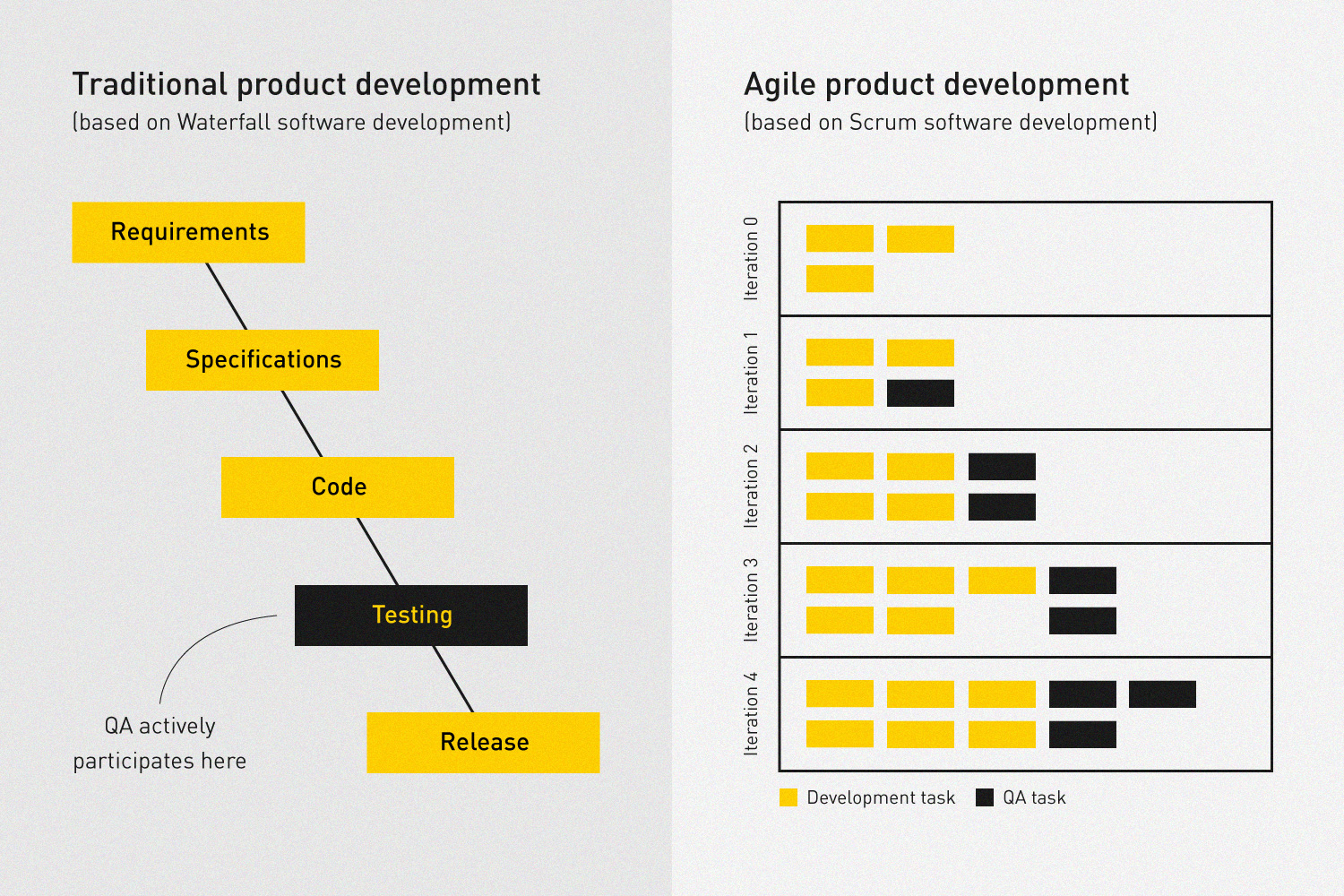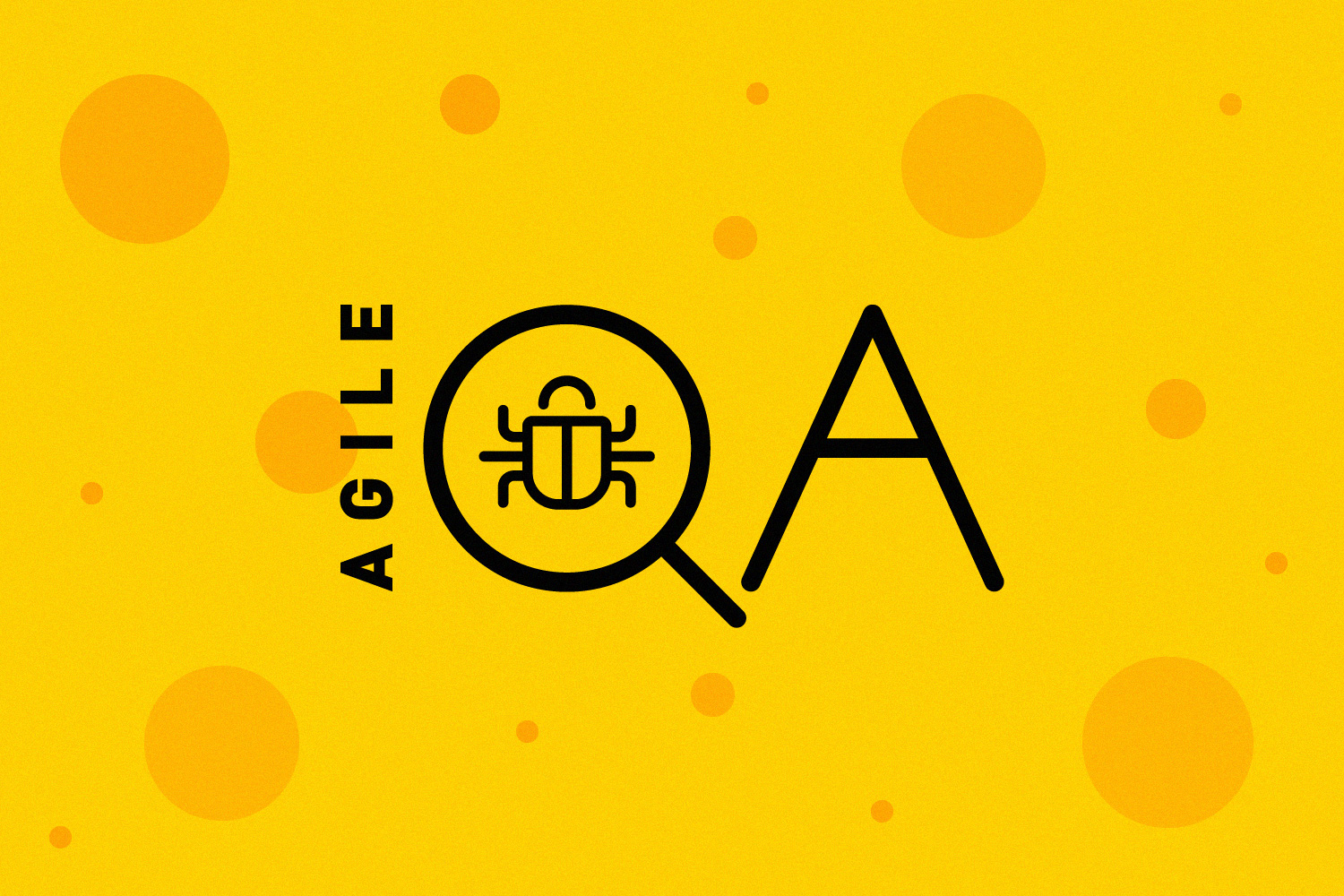The Importance of An Agile Quality Assurance Team
Here at Mooncascade, most of our software development projects are built using agile methodologies. Teams are focused on products, not tasks, and everyone is responsible for the end result. It’s a fast-paced process that requires vision, communication, and collaboration to run smoothly.
Clients often wonder about the importance of agile quality assurance – asking questions such as ‘Won’t a single testing phase be cheaper and work just as well?’ or ‘If the development team is so agile, do we need QA at all?’
Of course, appropriate QA is crucial in business, so if you’re using agile product development— you need agile quality assurance too so that QA can keep up. Used properly and in the right context, agile quality assurance will help your team be more flexible, cut waste, and generate long-term value for the product you’re developing. Here’s how.
What is agile quality assurance, and how does it work?

The main difference between agile quality assurance and traditional QA is iteration. Traditional QA is part of a linear approach where each stage (design, testing, delivery, etc.) has to be completed before moving onto the next. Testing is typically confined to one step within the development process.
In agile development, products are built in cycles called sprints. Testing happens on a smaller scale, but it’s used in a greater variety and frequency of cases. So it needs to happen fast and often.
At first glance, this might seem like an issue for software quality assurance. With more deliveries, it can be hard to test things without delaying the process or too easy to simply approve something that other team members have tested beforehand.
But agile quality assurance is more than simple testing. Agile QA managers have to move between accomplishing tasks, building sanity tests, and maintaining documentation. They provide their team with an in-depth knowledge of the product while ensuring that quality, usability, and client vision are maintained at every level of development.
In other words, your agile quality assurance manager is the glue that holds everything together: part project manager, analyst, developer, designer, business lead, product manager, and product owner all at once.
Why use agile quality assurance?
It keeps things flexible

In CI/CD, things change fast. Whether it’s a request from the client, a bug that needs to be fixed, or a new design element that needs to be integrated, projects can shift gears in the blink of an eye. People have to be able to react quickly to changing factors and work well across teams while doing so.
The dedicated testing phase of traditional QA just doesn’t cut it in this context. You need a quality assurance framework that’s as flexible as the rest of your development process: this means being able to scope and estimate testing quickly, design test cases, and automate testing with modular frameworks that don’t have to be rebuilt with each iteration.
The more agile your QA is, the more reactive your teams will be. You’ll be able to focus on maximizing your product’s business value, instead of getting caught up dealing with unexpected issues or changes along the way.
It cuts waste

With agile quality assurance, you’ll also drastically reduce waste during development. In traditional QA, a third of testing requirements are typically disregarded from the final product. This means that a third of the project’s analysis, testing, management, and development are carried out for no reason at all. The results are often notoriously buggy, too.
In an agile environment, iterations are tested as they happen. Not only does this help your team deliver a better version of the product in a shorter period of time, it also makes fixing bugs easy and greatly reduces any technical debt you may face later on.
I won’t lie: this approach may cost you more in the short run. But the efficiency and sustainability agile quality assurance brings to your project will almost certainly increase your returns in the long run.
It builds a better product

This last point is key. In a context where speed is king, QA plays a crucial role: making sure the product developed is the best it can possibly be.
One way agile quality assurance does this is by keeping teams informed and updated. QA managers make sure coworkers see the bigger picture through documentation, suggest changes or improvements after examining testing data, and reorient goals based on the client’s feedback. The more teams know, the better they can adapt, focus, and grow. And the better the product they’re developing can become.
This emphasis on communication also generates benefits beyond what’s being built: it helps the client better understand their target users, develop new ideas, and even get trained in using their product along the way. With agile quality assurance, knowledge isn’t just power. It’s value, every step of the way.
Agile software quality assurance: small trade-offs, big possibilities
Agile quality assurance has a number of short-term downsides. It has to be fast, which can be expensive. It involves constantly processing the flow of information you’re given, which can be a demanding, high-pressure job. It requires smooth communication and cross-team participation, which can be hard to realize in larger, corporate environments.
But for smaller teams, these trade-offs are easily made up for by the value stream agile quality assurance helps to produce. It’s key for any company looking to cut waste, stay flexible, and focus on quality in today’s fast-paced software development market. While it may involve taking risks and blurring boundaries, it’ll make the products you build more usable, more competitive, and more profitable than you had ever imagined possible.
Become a QA Specialist At Mooncascade
We are looking for a passionate QA to join our fast-growing team. If you want to be part of our agile quality assurance team and help to build exciting mobile and web products for international clients, then let us know about you!

